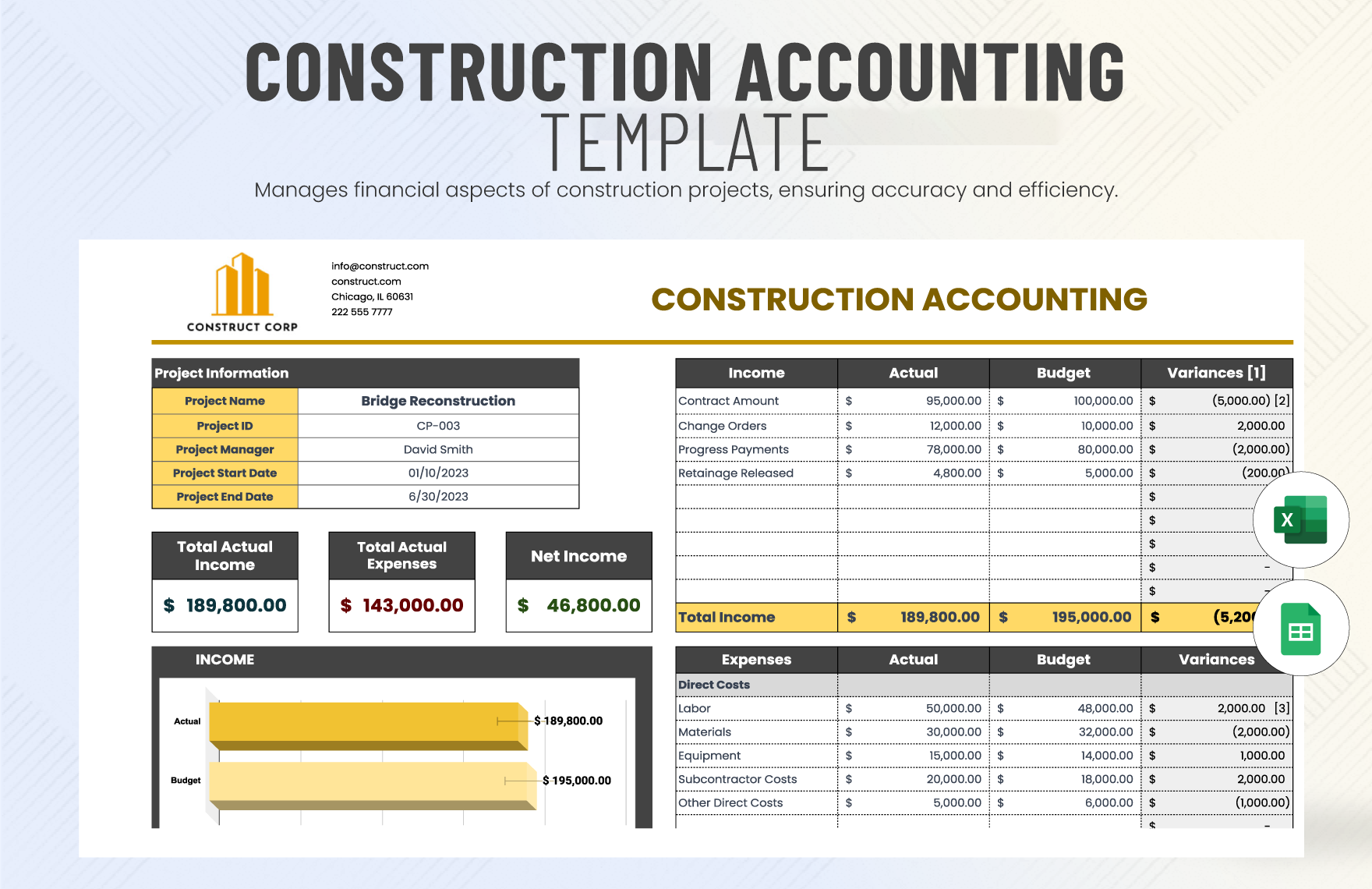Construction Accounting: How to Maintain Accurate Records and Improve Cash Flow
Construction Accounting: How to Maintain Accurate Records and Improve Cash Flow
Blog Article
Key Services Offered in Construction Audit to Improve Financial Oversight
In the world of building accountancy, vital services such as job price estimation, budget monitoring, and cash circulation analysis play an essential function in boosting economic oversight. Understanding these subtleties can dramatically influence the efficiency of monetary oversight in building jobs.
Job Price Estimate
Reliable task price estimation is an important part of effective construction accounting solutions, as it straight influences budgeting and economic preparation (construction accounting). Precise price quotes supply a detailed summary of the economic requirements for a building task, enabling stakeholders to make informed decisions pertaining to source allowance and job usefulness
A complete expense estimation process incorporates different aspects, including labor, products, tools, overhead, and contingencies. By evaluating historic information and current market fads, building accounting professionals can develop reasonable price quotes that reflect true project costs. This logical strategy not only aids in safeguarding financing but likewise enhances transparency and liability among all events included.
Additionally, exact price estimate functions as a structure for tracking and managing expenses throughout the project's lifecycle. By establishing a clear baseline, construction accountants can identify discrepancies in between estimated and real expenses, allowing for prompt changes and interventions.
Ultimately, efficient project price estimation not just promotes smoother project implementation but additionally enhances the general financial health of building companies, ensuring they stay competitive in an increasingly dynamic market. This calculated approach highlights the relevance of knowledgeable experts in supplying dependable and exact cost price quotes.
Spending Plan Management
In the world of construction audit solutions, budget administration plays a pivotal duty in guaranteeing that projects remain monetarily feasible and on course. Reliable budget plan administration entails the organized planning, monitoring, and regulating of job prices to align with monetary objectives. It begins with the development of a comprehensive budget that properly mirrors the awaited expenses of labor, materials, tools, and overhead based on thorough job cost estimate.
As soon as the budget is established, continuous tracking is vital. This consists of regular analyses of real expenditures against the budgeted figures, enabling for prompt recognition of discrepancies. By applying devices and software program tailored for building accountancy, task managers can produce real-time reports that help with educated decision-making.
Moreover, positive spending plan monitoring makes it possible for stakeholders to change monetary allowances and sources as necessary, advertising flexibility in action to unanticipated challenges. This flexibility is crucial in the building market, where job scopes can often alter. Eventually, durable spending plan administration not just strengthens financial accountability but also enhances overall task efficiency, making certain effective completion within the assigned financial parameters.
Cash Money Flow Evaluation
Capital analysis functions as a critical part of building and construction audit, allowing task supervisors to keep a clear understanding of the inflow and discharge of funds throughout the project lifecycle. This analytical process permits for the identification of possible cash shortages or excess, empowering supervisors to make informed decisions concerning budgeting and source appropriation.
By carefully tracking cash money inflows from customer payments, financings, and other income sources, alongside keeping an eye on discharges such as labor, products, and overhead costs, job managers can create an extensive money flow projection - construction accounting. This projection not only help in forecasting future monetary settings yet additionally aids in determining patterns that may affect project stability
Regular capital analysis promotes timely interventions, enabling task supervisors to resolve monetary challenges before they rise. This proactive strategy can minimize risks associated with delayed payments or unanticipated expenditures, eventually resulting in even more successful project completions. Effective cash money flow management adds to keeping solid connections with subcontractors and providers by making certain prompt payments.
Essentially, cash money circulation evaluation is a vital tool in construction audit, driving economic stability and functional performance throughout the period of building and construction tasks.
Regulatory Conformity Support
Regulative compliance assistance is crucial for construction companies navigating the complicated landscape of market policies and criteria. The building and construction sector is subject to these details a myriad of regional, state, and federal regulations, including safety and security criteria, labor regulations, and environmental standards. Non-compliance can result in considerable fines, delays, and reputational damage.
A durable conformity support group helps firms stay informed regarding relevant regulations and makes sure that they apply required policies and treatments. This consists of monitoring changes in regulations, giving training for workers, and performing routine audits to assess compliance levels. Construction accounting professionals play an important role in this process, supplying expertise to translate guidelines and straighten financial methods accordingly.
Additionally, regulatory compliance assistance incorporates the prep work and submission of needed paperwork, such as tax obligation filings and reporting for labor standards. By developing an aggressive conformity strategy, building and construction companies can reduce risks related to non-compliance, improve functional efficiency, and promote a society of liability.
Ultimately, effective regulative conformity support not just safeguards a construction company's economic health however additionally enhances its track record in the market, placing it for sustainable growth and success.

Financial Reporting and Insights
While navigating the complexities of the construction sector, exact monetary coverage and informative evaluation are crucial for notified decision-making. Building and construction jobs typically include substantial capital expense and changing expenses, making it essential for stakeholders to have access to clear and prompt economic data. Detailed economic records, including profit and loss statements, money flow projections, and annual report, provide a snapshot of a firm's financial health and wellness and efficiency.
Furthermore, tailored understandings obtained from these reports assistance supervisors determine patterns, evaluate job productivity, and make critical adjustments to enhance functional efficiency. Trick efficiency indicators (KPIs) certain to building and construction-- such as task margins, labor expenses, and overhanging ratios-- supply important criteria for evaluating success and forecasting future efficiency.
Additionally, routine economic coverage enables compliance with contractual commitments and fosters openness with stakeholders and capitalists. By leveraging advanced audit software and data analytics, building companies can enhance their economic oversight, allowing them to browse uncertainties better. Eventually, durable monetary reporting and workable insights encourage construction business to make enlightened decisions that promote development and sustainability in an extremely competitive market.
Conclusion

In the realm of building accountancy, crucial solutions such as project expense estimate, budget management, and cash money circulation analysis play a vital function in boosting financial oversight. Eventually, robust budget administration not only reinforces financial accountability but additionally improves total project efficiency, guaranteeing effective completion within the allocated financial specifications.

Report this page